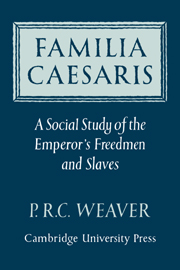Book contents
- Frontmatter
- Contents
- Preface
- Abbreviations
- INTRODUCTION
- PART I NOMENCLATURE AND CHRONOLOGY
- PART II THE FAMILY CIRCLE
- PART III THE EMPEROR'S SERVICE
- 12 Vicarii
- 13 Liberti servus and liberti libertus
- 14 ‘Vicariani’
- 15 The occupational hierarchy: some points of method
- 16 Sub-clerical grades
- 17 Adiutores: junior clerical grades
- 18 Intermediate clerical grades
- 19 Senior clerical grades
- 20 Senior administrative grades: a rationibus, ab epistulis, etc.
- 21 Freedman procurators
- 22 Imperial freedmen and equestrian status: the father of Claudius Etruscus
- CONCLUSION
- APPENDIXES
- Bibliography
- Index
20 - Senior administrative grades: a rationibus, ab epistulis, etc.
Published online by Cambridge University Press: 07 October 2011
- Frontmatter
- Contents
- Preface
- Abbreviations
- INTRODUCTION
- PART I NOMENCLATURE AND CHRONOLOGY
- PART II THE FAMILY CIRCLE
- PART III THE EMPEROR'S SERVICE
- 12 Vicarii
- 13 Liberti servus and liberti libertus
- 14 ‘Vicariani’
- 15 The occupational hierarchy: some points of method
- 16 Sub-clerical grades
- 17 Adiutores: junior clerical grades
- 18 Intermediate clerical grades
- 19 Senior clerical grades
- 20 Senior administrative grades: a rationibus, ab epistulis, etc.
- 21 Freedman procurators
- 22 Imperial freedmen and equestrian status: the father of Claudius Etruscus
- CONCLUSION
- APPENDIXES
- Bibliography
- Index
Summary
We must now consider perhaps the best-known of all Imperial freedman positions, the senior administrative grades in Rome, the headships of the great Palatine bureaux a rationibus, ab epistulis, a libellis, a studiis, a cognitionibus, a codicillis, a memoria and a diplomatibus. The roll-call of slave and freedman dignitaries with the first two of these titles in the inscriptions is a surprisingly long one. There are eighteen, possibly twenty, a rationibus, not counting M. Antonius Pallas and the father of Claudius Etruscus, all but three of whom are from the period before Hadrian. There are no fewer than seventeen ab epistulis, all probably before Hadrian, not counting a further four ab epistulis Latinis and two ab epistulis Graecis. It is obvious from the instances of slaves with these titles that a rationibus, ab epistulis, etc. cannot refer exclusively to the head of a department. The problem is how to distinguish between, e.g., an a rationibus and the a rationibus.
The lists given in Friedländer, as revised by Hirschfeld and later by Bang, are accompanied by no explicit formulation of the principles for distinguishing between the ‘oberste Dirigenten’ and the ‘Unterbeamten’. It is clear from their age and status that the slaves cannot be senior: Libanus Caesaris vern. ab epistulis (died aged 16), Victor Caes. vern. a cognit(ionibus) (d. 18), Abascantus Aug. a rat(ionibus) Attic(ianus), Apolaustus Caesaris a rationibus, Ianuarius Caesaris Aug. ab epistulis, Aphnius Caesaris Aug. ab epistulis.
- Type
- Chapter
- Information
- Familia CaesarisA Social Study of the Emperor's Freedmen and Slaves, pp. 259 - 266Publisher: Cambridge University PressPrint publication year: 1972
- 2
- Cited by



